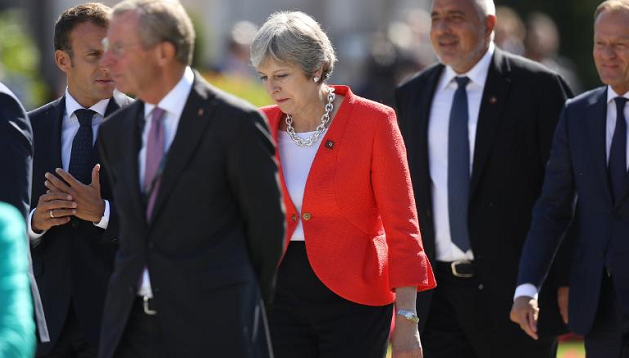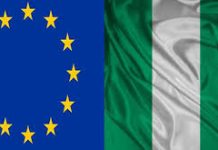UK Prime Minister Theresa May said Friday that negotiations with the European Union were “at an impasse” after a disastrous summit at which her Brexit plan was largely rejected.
May struck a defiant tone during a Downing Street statement in which she called for the European Union to “respect” the British position and the result of the June 2016 referendum.
A day after returning from the summit in Salzburg, she called for the EU to spell out its objections to her plan or come up with an alternative.
“Throughout this process, I have treated the EU with nothing but respect. The UK expects the same. A good relationship at the end of this process depends on it,” she said.
UK Prime Minister Theresa May, French President Emmanuel Macron, left and other leaders are seen on the second day of an informal summit of EU leaders on Thursday.
Downing Street had hoped the informal Salzburg summit would pave the way to a resolution of outstanding issues in Brexit talks before a formal meeting in October. Instead, the leaders of the 27 remaining EU nations were unexpectedly resolute in their opposition to her proposals.
Donald Tusk, President of the European Council, said key aspects of the plan, agreed at the Prime Minister’s Chequers country retreat in July, “will not work” in their current form.
The EU side has repeatedly accused Britain of wanting to “have its cake and eat it” and of “cherry picking” as it seeks to keep elements of the single market it likes and ditch others it doesn’t.
Conservative lawmaker Charlie Elphicke condemned Tusk’s post as “extraordinarily disrespectful.”
Speaking Friday, May said the two sides remained “a long way apart” but insisted the British “stand ready” to work on resolving the issues.
The main sticking point continues to be how to handle the border between Northern Ireland, which will remain part of the UK, and the Republic of Ireland, which will continue to be part of the EU. Neither side wants an arrangement that would require the rebuilding of border infrastructure, the removal of which was a key part of the Good Friday Agreement that brought peace to Northern Ireland after years of sectarian strife.
May, whose Chequers plan proposes a common rulebook on goods and services to ensure that no customs checks are needed, insisted that creating any form of customs border between Northern Ireland and the rest of the UK was unacceptable.
“It is something I will never agree to — indeed, in my judgment it is something no British Prime Minister would ever agree to,” she said. “If the EU believe I will, they are making a fundamental mistake. Anything which fails to respect the referendum or which effectively divides our country in two would be a bad deal and I have always said no deal is better than a bad deal.”
Troubles at home
Amid the uncertainty over the negotiations, she has been plagued by outspoken criticism from members of her own Conservative Party, in particular from ardent supporters of Brexit, who believe she has not been tough enough with the EU.
May will hope that her tough stance against the EU will insulate her from further such criticism, ahead of the Conservatives’ annual conference, which begins September 30.
Jacob Rees-Mogg, who chairs the powerful European Research Group, a fervently pro-Brexit caucus of Conservative MPs, praised May for being “strong and forthright” in Friday’s speech. But he also demanded that she abandon her Chequers plan.
Meanwhile, Remain supporters have been rallying behind a burgeoning campaign for a new referendum, known as a “people’s vote.”
London Mayor Sadiq Khan, a vocal Brexit opponent, warned May’s statemetn it moved the country “another step closer to the worst possible outcome from the Brexit negotiations — a catastrophic ‘no deal’ that would hammer jobs and economic growth.”
Khan, a member of the opposition Labour Party, called on the Prime Minister urgently to change course. “Passing the buck to the EU to save her skin will not work,” he said.













